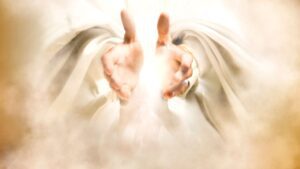Pastor Justin Baxter and Pam Kramer sat down to consider the concept of perfection and God.
Pam: PERFECT! We use many words to describe perfection every day.
This is the quintessential painting by Monet!
Your outfit is exquisite!
The weather is idyllic!
Your soufflé was out of this world!
Wasn’t he dreamy?
My dear, your complexion is flawless!
Then how can we also think of God, who lacks nothing in character and needs no additional attributes as perfect? Souffles, weather, and clothes aren’t the same degree of perfect, are they? Isn’t God perfect while everyone is flawed in some way? Or is He perfect? Or is He perfectly imperfect?
Pastor: Is God a perfect being? People have wrestled with this question since the dawn of time. Let’s go back to how God is portrayed in the Hebrew Bible. Rabbi’s argue, “the Bible itself seems far removed from supporting this view [God’s perfection]. Much of biblical narrative depends for its coherence on a view of God as being unable to control human action (and perhaps also the behavior of animals), and at times also as lacking foreknowledge of what human beings are going to do.” (From Yoram Hazony and Dru Johnson eds., The Question of God’s Perfection (Leiden: Brill, 2019). Hebrew scripture describes God in tangible terms – as in a father/mother category… human constructs that have limitations. In fact, throughout the OT, God changes God’s mind.
Pam: Surely there is more to understanding the nature of God. Yes, in the OT, I can picture an angry parent. But I don’t see God that way in the NT!
Pastor: To the Greeks, like Aristotle and Plato, human beings were imperfect. According to Aristotle, God is not the Creator of the universe but the One who causes it to move. However, God is perfect and a perfect being is self-sufficient having no desires and thus is neither dissatisfied nor unhappy. Hence, God is not the Maker but the Mover of the world. God is immutable, unchanging, all-knowing, and all powerful, quite the opposite of the tangible terms we find in the OT argument. The Aristotelian God, who is loved by all and is indifferent to the fate of the people of the world, is impersonal and perfectly unsatisfactory type of Supreme Being (in the modern context). He resembles the Primal Energy of scientists rather than the Heavenly Father of the poet.
Pam: If we accept some version that God is perfect, how do we explain why or how we, who are made in his image, are all so different? You and I don’t look alike, think alike, or share the same gender. We are created exactly the way God wanted us to be. Or does God make mistakes? Like an assembly line where something goes wrong? Or are all of God’s creations from the dinosaurs to present-day humans an ever-evolving series of experiments to improve His work?
Pastor: Maybe the idea of perfection is a human construct. To live without mistake, to be without flaws is simply impossible. Everything and everyone is (perfectly) imperfect. I find the idea of perfection hard… How will I know if I have achieved it? What does it look like? And IF I achieve it, can I lose it? Pretty exhausting.
Pam: I want to think about a child with special needs. In times gone by, imperfect children were left to die, or drowned, or hidden away as manifestations of the devil. Is it we, humans, who have determined that differences are bad? I think that God made special children for a very special reason. The child is exactly what God wanted him to be. Children’s book author, Patricia Polacco, wrote a tribute to young man with special needs who had recently passed. She wrote, “Anyone who knew him immediately recognized they were in the presence of profound beauty, staggering innocence, and were filled with the knowledge of God simply by touching him.” The special needs children and adults in our lives have been “chosen by God to be Angels among us and to lead us to be the best that humanity can offer.” (Facebook, April 21, 2021).
Pastor: So, who came up with the idea that a God is perfect? We did. When Moses asked God what God’s name was, God replied, “I will be what I will be.” And maybe we got it wrong. But if God is perfect and created only perfect things, what would be the point of life? Maybe God isn’t about perfection, but the beauty of the struggle and the evolution of the spirit (maybe even for God).
Pam: So, if you have read this and are still confused, so are we. But in the end only God has the potential to be perfect! Perfection of all things is in God. Perfection only exists in God.


